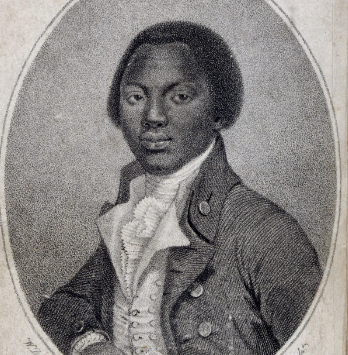Olaudah Equiano, a former African slave, was an author and a member of the British abolitionist group, Sons of Africa. His autobiography, The Interesting Narrative of the Life of Olaudah Equiano or Gustavus Vassa, the African, was one of the earliest books published by a black African writer.
Early Life
Olaudah Equiano was born in 1745. In his autobiography, he describes growing up in Essaka, Eboe, in the Kingdom of Benin (present day Nigeria). At the age of 11, he and his sister were kidnapped by slave traders and taken to Barbados. While some scholars believe that he was actually born in the Americas, others believe Equiano’s account in his biography to be accurate.
After being transported to Virginia, Equiano was bought by Michael Henry Pascal, a lieutenant in the Royal Navy, who renamed him “Gustavus Vassa,” after the 16th-century Swedish king. Pascal brought Equiano back with him to England, and he accompanied the Naval officer during several important battles. Pascal also taught Equiano how to read and write.
After being sold to a British ship captain, who took him to Montserrat, Equiano was sold to a Quaker merchant named Robert King. King taught Equiano his business and allowed him to earn money by trading on the side. After three years, Equiano was able to buy his own freedom.
Abolitionist Movement
After traveling extensively as a free man, Equiano returned to London, where he connected with members of the abolitionist movement. In 1789, Equiano wrote his extremely successful autobiography, The Interesting Narrative of the Life of Olaudah Equiano, or Gustavus Vassa, the African. In telling the story of his early life, enslavement, freedom, and challenges as a free black man, Equiano spoke out against the British slave trade.
The publication brought Equiano respect and notoriety in the abolitionist movement. In total, 11 editions were published in his lifetime. His book was also subsequently published in Russia, Germany, Holland, and the United States
Later Life
Equiano died in 1797. While Equiano did not live to see Britain act on his calls for abolition, he is widely credited for establishing the genre and format of the “slave narrative,” which gave future black authors a framework to tell their own stories.






